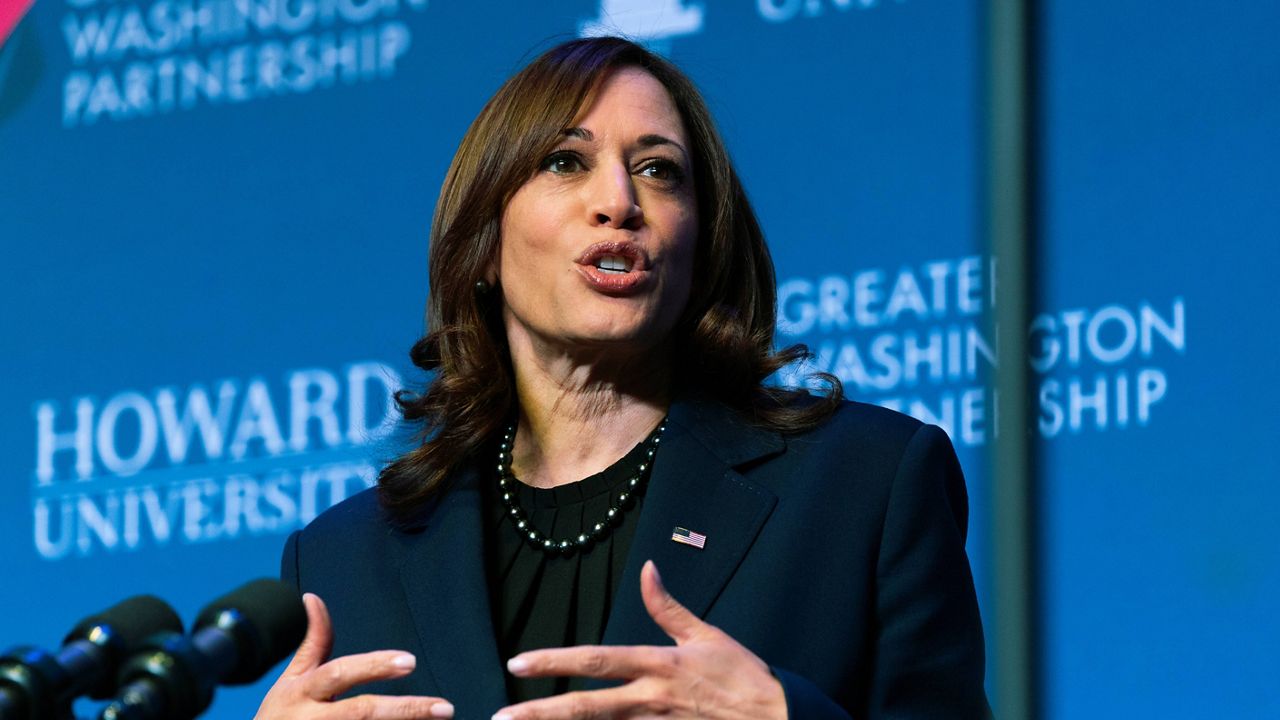Saying the U.S. economy is driven by the ambitions of small-business owners, Vice President Kamala Harris announced Wednesday that the Biden administration is extending and expanding a pilot program that helps underserved entrepreneurs gain access to capital.
What You Need To Know
- Vice President Kamala Harris announced Wednesday that the Biden administration is extending and expanding a pilot program that helps underserved entrepreneurs gain access to capital
- Speaking at an event at Howard University in Washington, Harris said the Small Business Administration’s Community Advantage program, which was set to end in September, is being extended through September 2024
- The Biden administration also is lifting a four-year moratorium on lenders in the program and raising the maximum loan size from $250,000 to $350,000
- The event was hosted by the Greater Washington Partnership, which announced that more than two dozen organizations have pledged $4.7 billion over five years to advance inclusive business growth in the capital region
Speaking at an event at Howard University in Washington, her alma mater, Harris said the Small Business Administration’s Community Advantage program, which was set to end in September, is being extended through September 2024. The Biden administration also is lifting a four-year moratorium on lenders in the program and raising the maximum loan size from $250,000 to $350,000.
The pilot program was launched in 2011 during the Obama-Biden administration to give small businesses in underserved markets credit, management and technical assistance. It aims to provide “mission-oriented lenders” — primarily nonprofits focused on economic development — with federal loan guarantees.
“Small-business owners work morning and night to transform an idea into a reality,” Harris said. “And that energy, of course, drives our entire nation forward. It creates jobs. It drives innovation. It accelerates economic growth.”
But, she said, “in America today, too many small businesses and too many entrepreneurs are also being left behind.”
According to Stanford University’s Institute for Economic Policy Research, Black entrepreneurs are three times more likely to say they did not apply for a loan because they feared their application would be denied.
Harris also said Black and Latino entrepreneurs are less likely than white applicants to be approved for small-business loans from traditional financial institutions, people in rural areas and tribal communities lack access to traditional banking services, and Asian Americans face language barriers that limit their opportunity to access capital.
That’s where community lenders come in, the vice president said. Because they often live in those communities, they better understand the visions of the entrepreneurs, she said.
Harris told the story of a small-business owner from Oakland, California, named Rain, whom she met last year. Rain wanted to purchase a van for her catering company but was told by a traditional bank that she was “unbankable.”
“Rain, not being deterred by a word, went to a community lender, and that lender, of course, saw her vision to build a catering company that made fresh, local and sustainable food cooked with love and served with care,” Harris said. “And they, of course, gave Rain that loan to buy that van. And today, Rain runs one of the most successful catering businesses in Oakland. She has catered for clients from the mayor to the Golden State Warriors.”
The Biden administration also announced Wednesday that it is removing restrictions that blocked individuals with criminal backgrounds from the Community Advantage program, and it is simplifying underwriting and collateral requirements — including raising the maximum unsecured loan size from $25,000 to $50,000 — that have disproportionately impacted underserved borrowers.
“When we talk about how we are doing as a nation and the strength of our nation and we look to, as a measure that the strength, our economy, then we must ask, how are small businesses doing?” Harris said. “And are we doing enough for them?
“Let us continue to all work together to address the inequities that stand in the way of the ambition and the aspirations of our communities,” she added.
The event was hosted by the Greater Washington Partnership, which announced that more than two dozen organizations have pledged $4.7 billion over five years to advance inclusive business growth in the capital region. The participating companies include heavyweights such as Amazon, Bank of America, Capital One, JPMorgan Chase & Co., Northrop Grumman Corp., the Washington Commanders football team and Wells Fargo.
Commerce Secretary Gina Raimondo and Isabella Casillas Guzman, head of the Small Business Administration, also attended the event.
“Homogeneity is the enemy of innovation,” Raimondo said in her remarks. “Think about that for a second. It's true. If you have people who all have the same background, same ideas, same viewpoints, you won't innovate. If we are really going to unlock the full potential of our economy, then we have to be committed to equity.”



